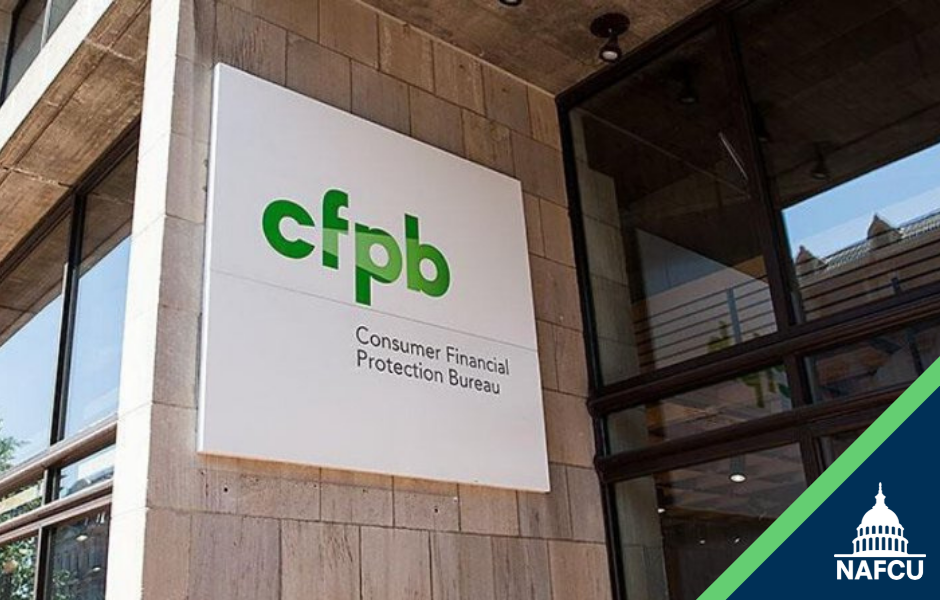Newsroom
NAFCU to CFPB: Distorted representation of 'junk fees' leads to consumer frustration
 NAFCU Vice President of Regulatory Affairs Ann Kossachev Friday submitted feedback to the CFPB on their request for information (RFI) regarding fees on consumer financial products and services, or "junk fees." The bureau intends to use responses from the RFI to help with "enforcement, supervision, regulatory, and other authorities to create fairer, more transparent, and competitive consumer financial markets."
NAFCU Vice President of Regulatory Affairs Ann Kossachev Friday submitted feedback to the CFPB on their request for information (RFI) regarding fees on consumer financial products and services, or "junk fees." The bureau intends to use responses from the RFI to help with "enforcement, supervision, regulatory, and other authorities to create fairer, more transparent, and competitive consumer financial markets."
Kossachev commented that while NAFCU is supportive of the CFPB improving consumers’ understanding of financial products and services, its mischaracterization of fees in the financial services as “junk fees,” “excessive or exploitative fees,” or “inflated or surprise fees,” only confuses and frustrates consumers. Financial institutions, including credit unions, already provide legally required disclosures which have made a positive impact on consumers’ understanding of product fees and pricing.
“Credit unions do not obscure the cost of their products and services, but rather provide members with a simple schedule of fees or cost recovery schedule disclosure for their products and services at account opening and before a fee-based transaction to ensure the consumer is able to opt-out of that particular transaction, if they so choose.” wrote Kossachev.
NAFCU urged the bureau to conduct further analysis on the markets and products listed in the RFI before taking any supervisory or regulatory action. Limiting or regulating these programs out of existence can have adverse impacts on credit unions’ ability to serve their communities. The association also encouraged the CFPB to provide greater clarity on existing regulations “to improve access to these services and establish a fairer market that allows consumers to reach their financial goals.”
Of note, Kossachev also highlighted the following:
- The CARD Act has had a significant impact on limiting credit card fees, which are always disclosed to consumers upfront. The CFPB should evaluate non-depository institutions, such as fintechs, entering the credit card market and utilize its authority to provide greater consumer protections;
- The bureau's own rule imposes such exorbitant expenses and compliance costs to offer remittances, which contribute to high fees. To combat this, the CFPB should explore the potential of digital assets to facilitate faster, cheaper, and safer cross-border payments, but should adopt a flexible regulatory framework; and
- Prepaid accounts and cards, as listed in the RFI are highly regulated. The bureau should not conflate abuses of the compulsory use prohibition with improper disclosure or use of fees in the entire prepaid market.
Kossachev pointed out that mortgages are among the most highly regulated products in the financial services marketplace, with the Truth in Lending Act (TILA), Real Estate Settlement Procedures Act (RESPA), and TILA-RESPA Integrated Disclosures Act (TRID) providing comprehensive disclosures; however, some fees are unavoidable and out of the credit union’s control. The CFPB’s own assessment of the effectiveness of TRID shows that disclosures increased consumers’ understanding of fees. The CFPB should use its innovation policies to further simplify and improve mortgage disclosures.
View NAFCU’s full letter. Comments on the CFPB’s RFI are due today. NAFCU detailed the CFPB's inquiry and solicited member credit union feedback via a Regulatory Alert; the association will keep members aware of any developing actions from the CFPB.
Share This
Related Resources
Add to Calendar 2024-06-26 14:00:00 2024-06-26 14:00:00 Gallagher Executive Compensation and Benefits Survey About the Webinar The webinar will share trends in executive pay increases, annual bonuses, and nonqualified benefit plans. Learn how to use the data charts as well as make this data actionable in order to improve your retention strategy. You’ll hear directly from the survey project manager on how to maximize the data points to gain a competitive edge in the market. Key findings on: Total compensation by asset size Nonqualified benefit plans Bonus targets and metrics Prerequisites Demographics Board expenses Watch On-Demand Web NAFCU digital@nafcu.org America/New_York public
Gallagher Executive Compensation and Benefits Survey
preferred partner
Gallagher
Webinar
Add to Calendar 2024-06-21 09:00:00 2024-06-21 09:00:00 The Evolving Role of the CISO in Credit Unions Listen On: Key Takeaways: [01:30] Being able to properly implement risk management decisions, especially in the cyber age we live in, is incredibly important so CISOs have a lot of challenges here. [02:27] Having a leader who can really communicate cyber risks and understand how ready that institution is to deal with cyber events is incredibly important. [05:36] We need to be talking about risk openly. We need to be documenting and really understanding what remediating risk looks like and how you do that strategically. [16:38] Governance, risk, compliance, and adherence to regulatory controls are all being looked at much more closely. You are also seeing other technology that is coming into the fold directly responsible for helping CISOs navigate those waters. [18:28] The reaction from the governing bodies is directly related to the needs of the position. They’re trying to help make sure that we are positioned in a way that gets us the most possibility of success, maturing our postures and protecting the institutions. Web NAFCU digital@nafcu.org America/New_York public
The Evolving Role of the CISO in Credit Unions
preferred partner
DefenseStorm
Podcast
AI in Action: Redefining Disaster Preparedness and Financial Security
Strategy
preferred partner
Allied Solutions
Blog Post
Get daily updates.
Subscribe to NAFCU today.
